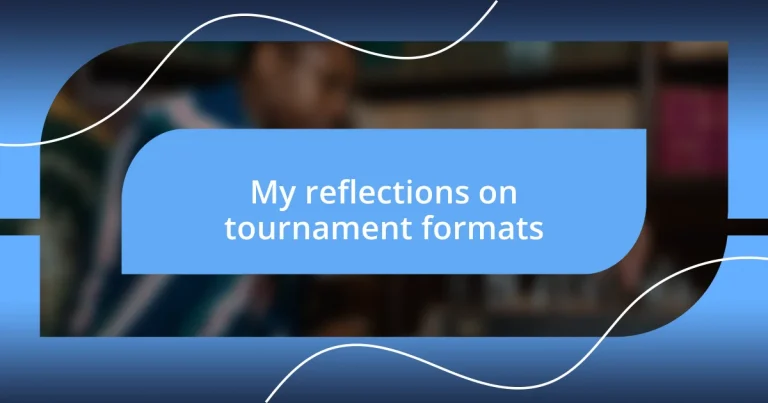Key takeaways:
- Tournament formats significantly impact the competitive experience, with single-elimination creating high stakes, while round-robin promotes consistency and learning through diverse matchups.
- Each format has distinct advantages and disadvantages, such as the pressure of single-elimination versus the fatigue that can arise from round-robin competitions.
- Successful tournament organization requires clear communication, a realistic schedule, and participant feedback to enhance the overall experience and ensure future improvements.
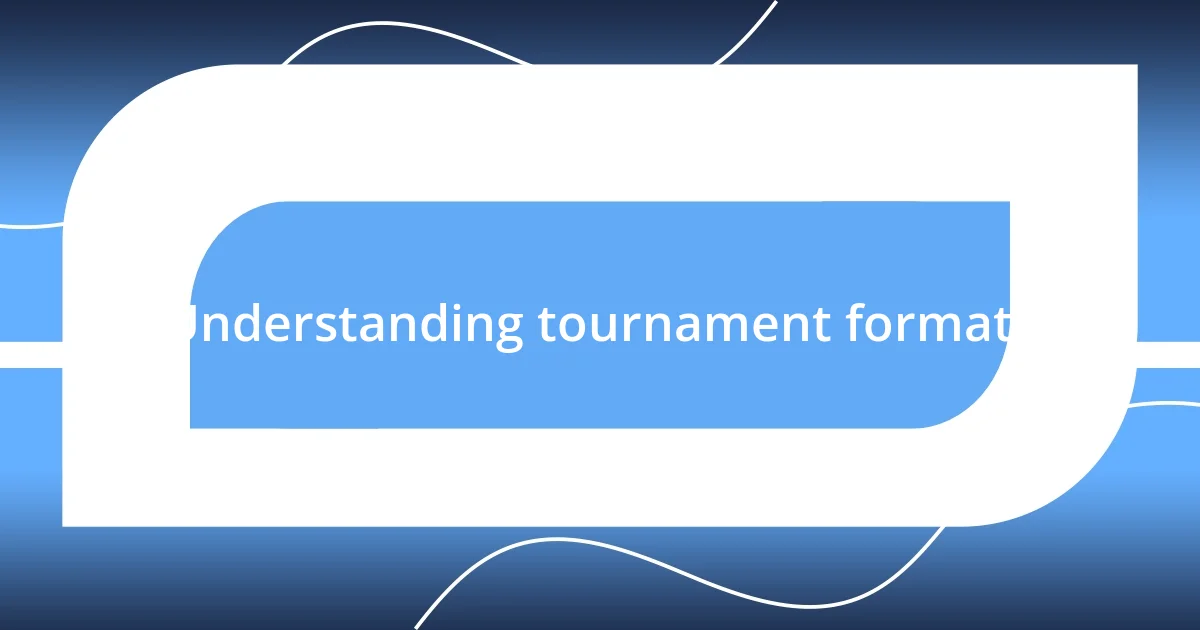
Understanding tournament formats
When diving into tournament formats, it’s fascinating to see how they shape the entire experience of competition. For example, I’ve often noticed that single-elimination tournaments can create an exhilarating atmosphere, where every match feels like a high-stakes showdown. Have you ever felt that adrenaline rush when your favorite team is one match away from elimination?
But what about round-robin formats? I remember participating in one a few years ago, and it taught me the value of consistency over time. Every match mattered, and the opportunity to play against multiple opponents made the overall experience richer. It’s not just about the thrill of winning; it’s also about learning from losses, which often happens when there’s a larger pool of opponents to face.
If you’re new to tournament structures, understanding these nuances can empower you to strategize better. For instance, in a Swiss system, every round pits players against others with similar records. I find this format intriguing because it fosters a deeper sense of community; you’re competing against equals, which not only elevates the competition but also builds camaraderie among players. How do you see these formats impacting your own experiences in tournaments?
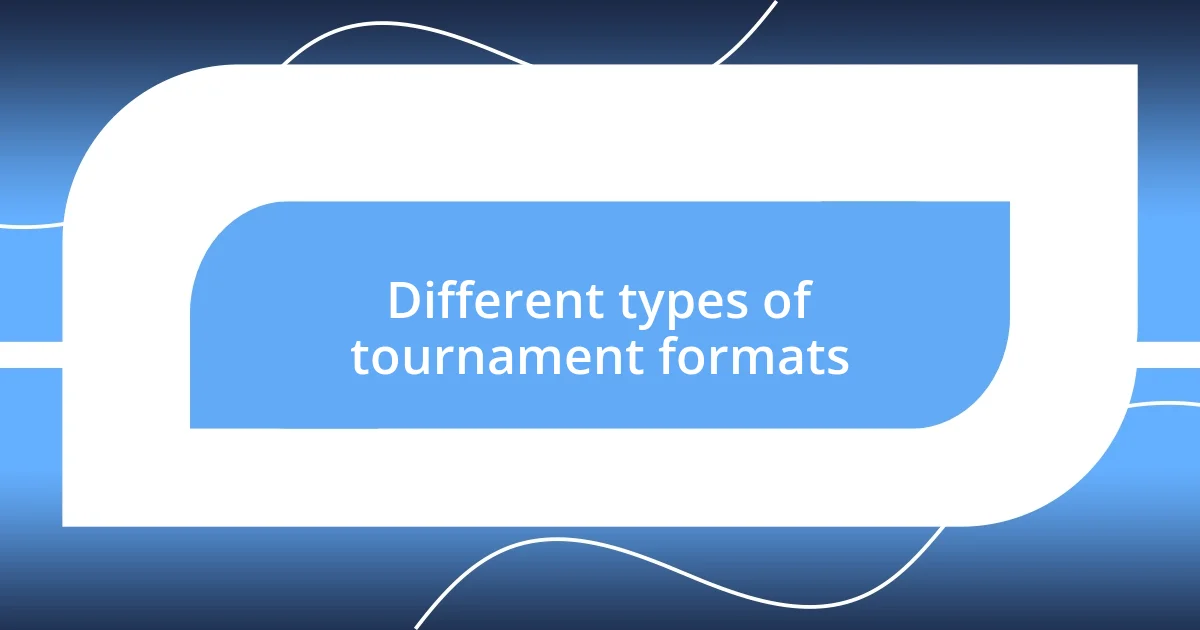
Different types of tournament formats
When it comes to tournament formats, the diversity truly amazes me. Each format brings a distinct flavor to the competition. Take, for instance, the double-elimination format. I recall my experience in a local gaming tournament where this setup allowed me a second chance after one loss. It felt comforting to know that I could bounce back, which lessened the pressure and made me more strategic in my gameplay.
Here’s a concise breakdown of some common tournament formats:
- Single Elimination: Teams or players are eliminated after one loss. High stakes and intense pressure define this format.
- Double Elimination: Competitors have a second chance, losing only after a second defeat. This fosters resilience and strategic depth.
- Round Robin: Everyone plays against each other, emphasizing consistency and adaptation, as I’ve so personally learned.
- Swiss System: Players compete with others who have similar records, creating a more level playing field, fostering both competition and community spirit.
- League Format: Teams rack up points over several matches, emphasizing long-term performance, which I find exciting as it captures ups and downs over time.
Each format resonates differently, often reflecting the emotional dynamics of the competition itself.
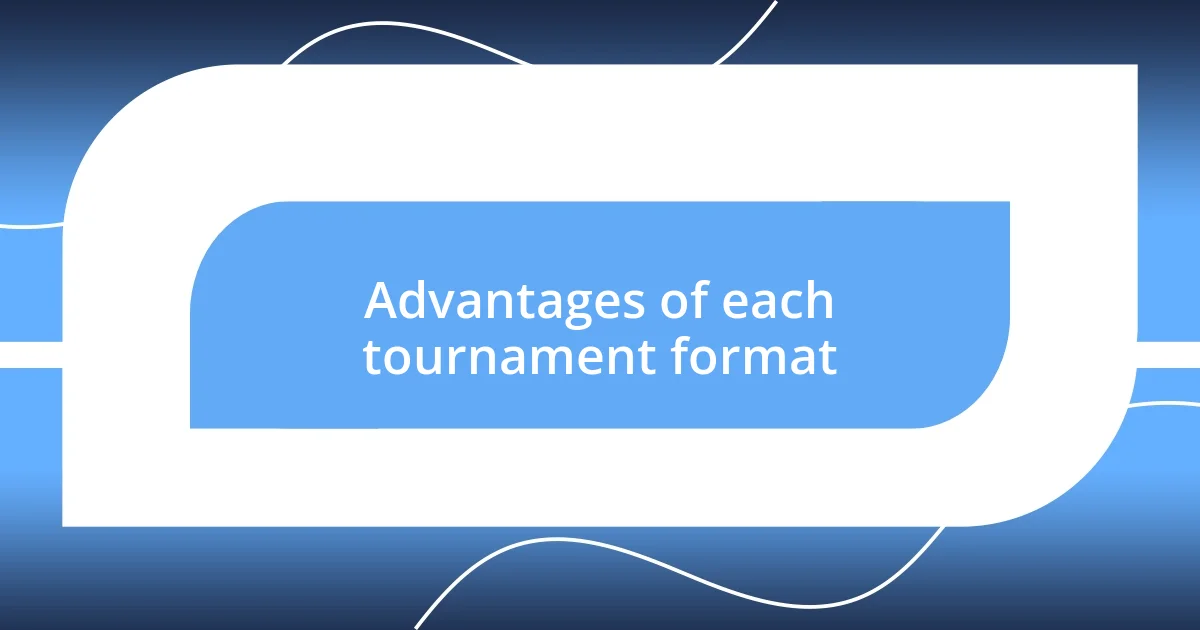
Advantages of each tournament format
The single-elimination format is a double-edged sword. While it creates an electrifying atmosphere, it also heightens the emotional stakes. I remember the nail-biting tension of watching a close friend compete; one mistake, and it was over. This format can foster unforgettable memories, as every match is pivotal and thrilling.
On the other hand, the round-robin format stands out for its inclusivity. Everyone has the chance to compete against multiple opponents, which can enhance player growth. I once participated in a round-robin chess tournament, where I learned valuable strategies from my competitors. It was eye-opening to watch how different players approached the game, which showed me that learning can happen in every match, win or lose.
The Swiss system is uniquely engaging as well, particularly for its fairness. I recall a tournament where I found myself matched against players of similar skill levels. It felt rewarding to have evenly matched opponents, making each game competitive yet enjoyable. This format encourages growth and community, as I felt like I was on a journey with my fellow competitors, pushing each other to improve.
| Tournament Format | Advantages |
|---|---|
| Single Elimination | High stakes create excitement; pivotal matches lead to unforgettable experiences. |
| Double Elimination | Allows for a second chance; fosters strategic play and resilience. |
| Round Robin | Encourages learning through diverse matchups; promotes consistency and adaptation. |
| Swiss System | Creates fair matches; encourages player growth and community spirit. |
| League Format | Highlights long-term performance; captures overall highs and lows over time. |
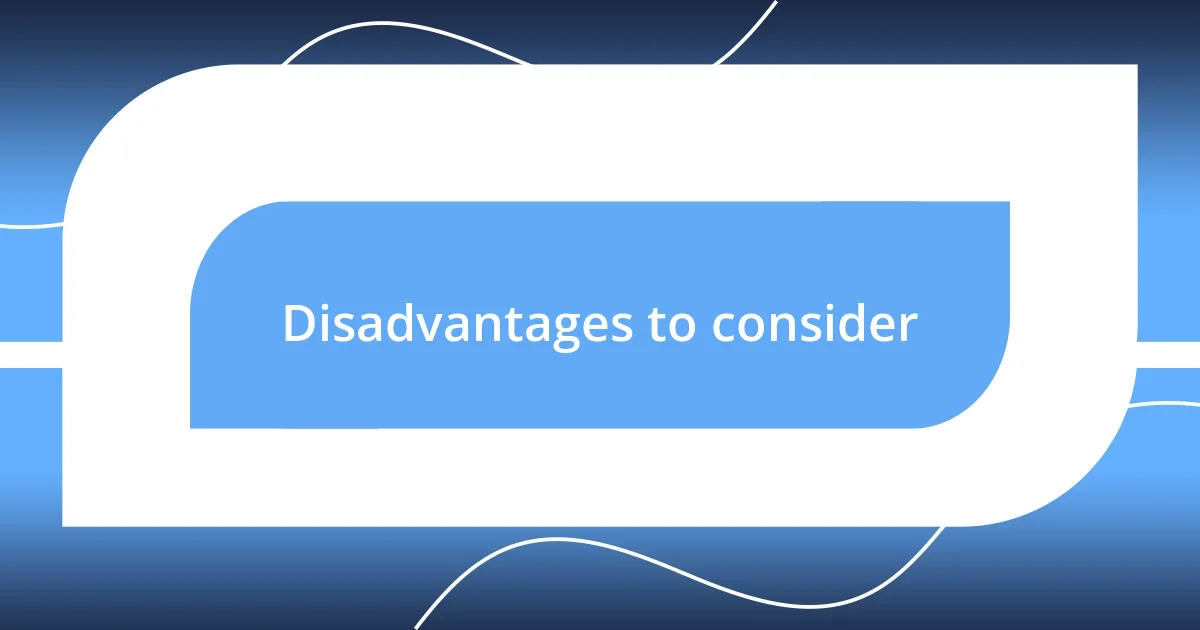
Disadvantages to consider
Tournament formats certainly have their pitfalls, and I’ve experienced a few firsthand. One significant downside is the single-elimination format’s tendency to create an overwhelming pressure cooker environment. I remember being at a tournament where the atmosphere left my hands clammy and my heartbeat racing. Losing once meant the end of my journey, which could stifle the joy of playing. Isn’t it strange how something designed for fun can amplify anxiety?
Then there’s the double-elimination format, which, while generous, can still pose challenges. For instance, I had a teammate who had to expend much more energy after an early loss. While he had that second chance, it felt like an uphill battle that drained his stamina and focus in the long run. It made me wonder—does the safety net of a backup chance truly enhance the experience, or can it sometimes complicate it?
The round-robin format, with its inclusive spirit, can also inadvertently lead to fatigue. In one tournament, I played match after match with little time to regroup. While it’s great to face diverse competitors, I found myself feeling mentally exhausted by the end. Does the promise of growth outweigh the risk of burnout? It’s a delicate balance, and each competitor navigates it differently.

Choosing the right format
Choosing the right format for a tournament can really shape the entire experience for players and spectators alike. I remember a time when we debated between a round-robin and a double-elimination format. Ultimately, we chose round-robin—allowing everyone to play multiple matches— which fostered camaraderie, but I still wondered if the stress of elimination would have heightened the excitement even more. Doesn’t a little pressure sometimes make us rise to the occasion?
Another key factor is the skill level of participants. I once took part in a Swiss system tournament, and it felt amazing to be matched against players who challenged me appropriately. There’s something so invigorating about competing against similarly skilled opponents. It not only kept the matches thrilling but also pushed me to refine my strategies. Have you ever noticed how the right matchup can transform the vibe in the whole room?
At times, the format selection can inadvertently change the dynamics of teamwork and community spirit. I recall my first experience in a league format, where we kept tracking performance across several weeks. While it added pressure to maintain consistent performance, it also gave us the chance to bond as a team. Seeing our gradual evolution as players was truly rewarding. Isn’t it fascinating how the right structure can create a supportive environment while keeping competition alive?
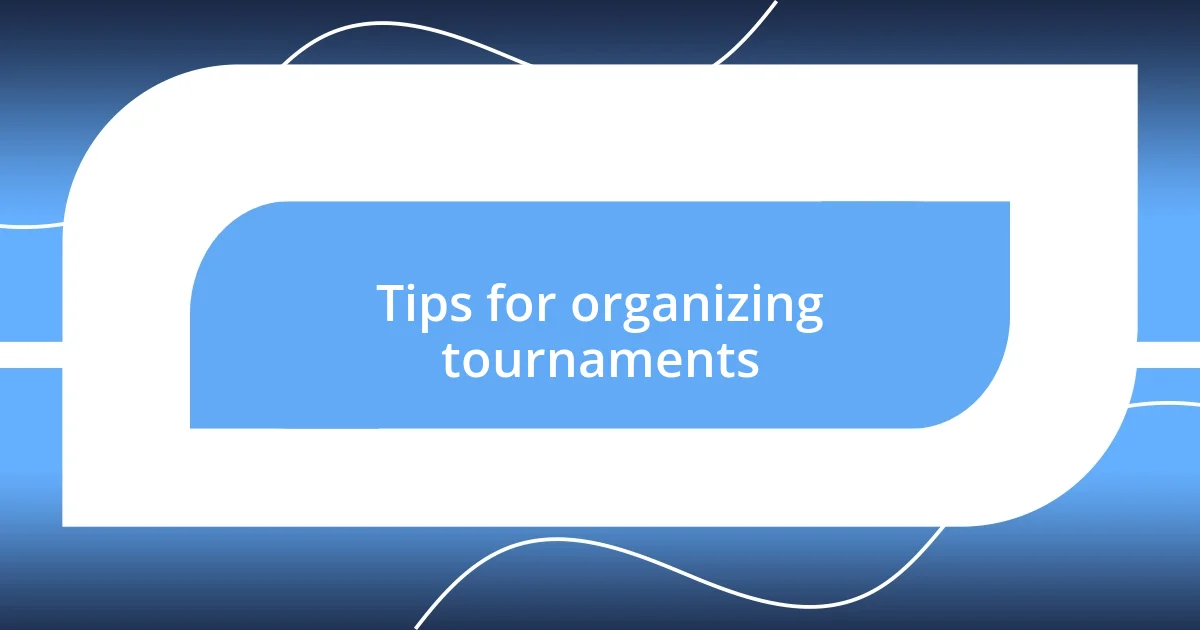
Tips for organizing tournaments
When organizing a tournament, communication is key. I recall a lively event where updates about match times and formats weren’t shared clearly, leading to confusion and missed games. I’ve learned that keeping players informed not only minimizes frustration but also builds an atmosphere of trust. How comfortable can a competitor feel when they aren’t sure what’s happening next?
Another crucial tip is to create a realistic schedule. I once participated in a tournament that seemed to have a perfectly balanced timetable on paper, yet it stretched on for hours longer than expected. Players were left exhausted and irritable by the end. It taught me the importance of factoring in breaks—not just for the players to recharge, but to maintain the overall energy of the event. Isn’t it essential to keep enthusiasm alive in such high-stakes situations?
Lastly, consider implementing a feedback system after the tournament. I remember finishing a weekend event where an easy-to-fill-out survey could have offered insights to improve the next tournament. Participants want to feel their opinions matter, and this small gesture can significantly influence future organization. How often do we overlook such simple steps that can enhance everyone’s experience?
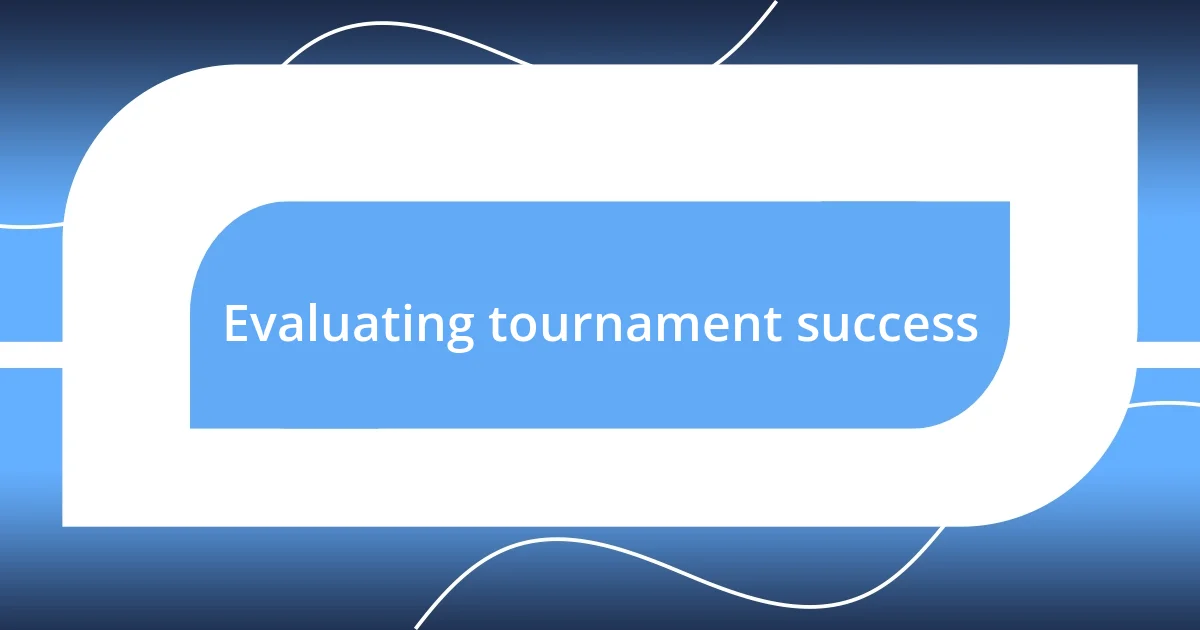
Evaluating tournament success
Evaluating the success of a tournament goes beyond just the winner’s trophy; it’s about the overall experience for everyone involved. I remember one tournament that, despite offering thrilling matches, fell short due to poor organization. Players expressed their frustrations, and honestly, a well-run event can leave a lasting positive impression, making them eager to return. Can you think of a time when the logistics truly made or broke an event you attended?
Participant feedback is essential in this evaluation process. For instance, after a fun local tournament I played in, we were given the opportunity to share our thoughts on everything from food options to match scheduling. Many players suggested minor changes, which were surprisingly impactful. It struck me how valuing player input can transform the dynamics of future events. Have you ever felt your opinion could change the future of something you cared about?
Lastly, considering the atmosphere created during the tournament is vital. At one particular event, the energy was electric, vibrant with support from the audience and fellow competitors. I noticed it motivated players significantly, even in moments of tension. This camaraderie not only enhanced performance but also cultivated lasting friendships. Isn’t it fascinating how a shared experience can elevate success beyond just the game itself?












